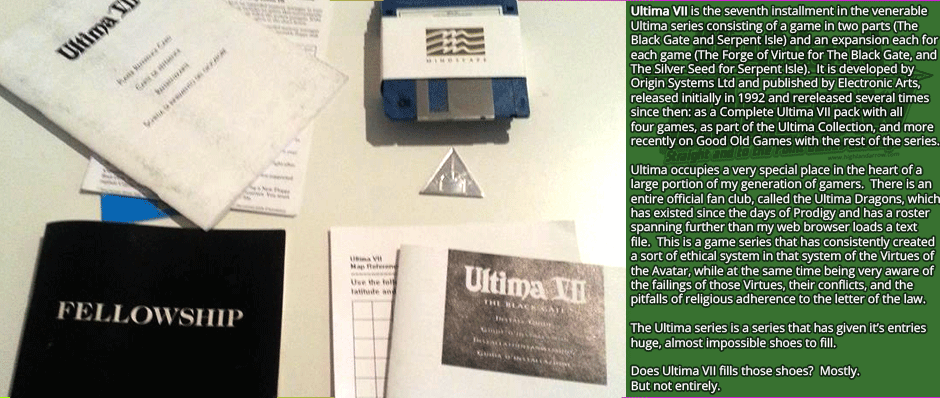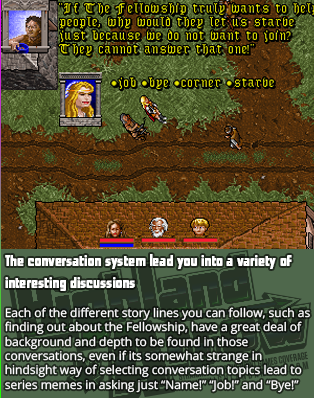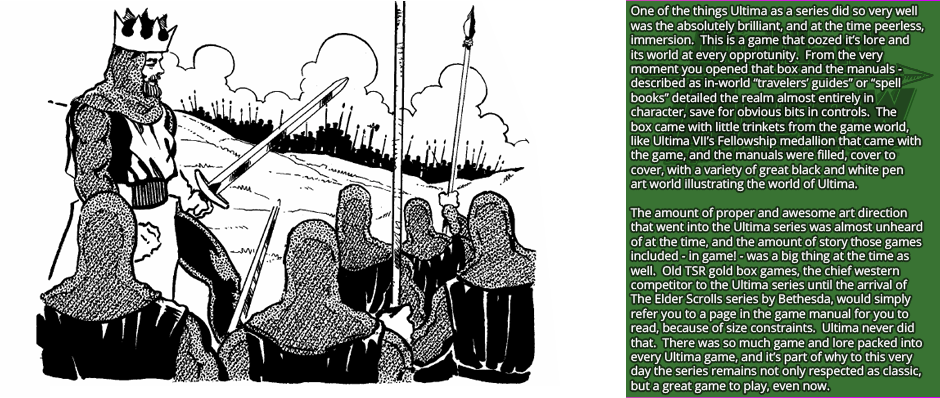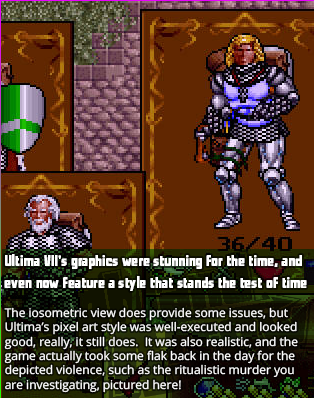


Ultima VII
Platforms: PC
Reviewed on: PC
Reviewer: Maiyannah Bishop
Review Play-Time: 482h
Developer: Origin Systems Ltd
Publisher: Electronic Arts
Released: 1992-05-24
Review Published: 2014-08-29
Review Updated: 2021-12-22
+ Immersive and incessantly-detailed world
+ Elegantly-simple statistics system
+ Interesting and complex story
+ Timeless graphical style
- Tiresome inventory system
- Story not as deep as previous installments
- Complexity of story can be difficult to follow
- Problematic AI

Let's get something out of the way first: Now wait a moment May, you might rightfully say, this is an old game, sure it's a classic, but surely this isn't relevant in this day and age? On the contrary, I would say that it has a penultimate importance. So here's a lengthy preamble, to get the reason for this review off my chest. Actual review follows in the next two pages. Scroll down and hit on to the next page if you just want to read the review.
Still here? Alright then. Well, the reason I'm writing this now is simple: to each gamer, to each games writer, there is that game that is "the" game. The game that made them really say "yeah, I really like gaming". The game that reminds them that games as a medium are important to you personally. The game that reminds that that gaming is worth defending.
To me, Ultima VII is that game. It's not perfect. It has it's flaws, and we're going to talk about them in this review. But this is the game that I have sunk a non-trivial percentage of my life into. I have played this game regularly, literally since its release in 1992, when I got a copy of the first installment, The Black Gate, bundled with software with the Sound Blaster 32 software CD our family got with that sound card.
So by all means, do take my words with a grain of salt, because I have an obvious bias and emotional attachment here. This is my love letter, to gaming, to games development, and to the industry and more importantly the hobby that I love. We've had an almost soul-crushing last couple of weeks in gaming. A deeply depressing one. And to that I say: bother that nonsense. You people trying to make me feel bad about playing things I enjoy playing, you don't deserve to be in this industry. There are a lot of super-talented people who make very great games, classics of their medium or simple popcorn bits of entertainment both, and some people will enjoy them and others won't. It's okay to disagree.
So this is me, writing about the game I enjoy most, to remind myself, as much as anyone else, that I love this hobby, I love Richard Garriott and his team for making a great roleplaying game, and I love the many other developers who put their very livelihoods, and increasingly, sanity and emotional well-being, on the line, so that this ailing old curmudgeon of a Scot can derive some interactive enjoyment out of her spreadsheet machine.
To the developers and publishers of those games, current games, future games: thank you, from the bottom of this weathered and scarred heart, for deciding to take time and risks with your life just to entertain me.
To the gamers who have been constantly belittled by the many talking heads in this whole shitstorm: keep your chin up. You are, for the most part, entirely good and reasonable people. Don't let anyone talk down on what you enjoy. You have the power. You pay for the games. You provide the ad revenue. You provide the subscription revenue. You provide the kickstarter funds. You are powerful, reasonable people who want to enjoy your hobby. Don't let anyone take that hobby from you.
Right, we're kind of getting a soapbox article and review in one here, aren't we? Onto the actual review for us! Let us Journey Onward...

Ultima VII is a bit of an odd duck to the series, one of two games in the series (the other being Ultima IV) where there really isn't the immediate threat of the big bad. It does have one, in the guise of the Guardian in his first appearance in the Ultima series, but the actual story of the game is more of a detective yarn. When you arrive in Britannia, your first task at hand other than getting yourself set up and reconnecting with old companions is investigating a grisly murder in the Trinsic stables, Trinsic being the city where you arrive.

The story of Ultima VII is complex and compelling
I doubt I could sum it up in a paragraph without leaving huge swathes of the story out. The game has a lot going on, it simulates a world after all, and unlike many of it's successors, that's a living, breathing world with a LOT of stuff going on. There's the rise of a new religion, called the Fellowship, bringing on questions of the character's relevance in modern times as the antiquitated symbol of the Virtues, there's the malfunction of magic and the madness this has caused most mages, and there's all manner of smaller sub-plots along the way, including a variety of characters new and old, such as your old companions Iolo, Shamino, Dupre, and more, and new faces in the murdered blacksmith's son Spark, or the ranger Tseramed who can fashion sleep arrows.
Just the quest line getting out of the first town is involved enough, with the town essentially locked down because of the murder. The mayor approaches you and enlists your help with the murder case, and you speak to many people and follow many leads, until you discover the ship the murderers apparently used to excape, and their alleged identities, recounting that information to the mayor, and, if they're satisfied (ie, you uncovered all the pertinent information, essentially), they would discharge you, and you could venture forth into the world - after answering some copyright protection questions, the early 90s version of DRM! Mind the immersion!
That's more or less the preamble to the world opening up, and while it's suggested you visit Britain and catch up with old companions as well as speak to Lord British, lord of the realm, you can do pretty much anything at this point, and there is a lot to do and investigate, as I've mentioned - the malfunction of magic, looking into this new "Fellowship", and that ongoing murder investigation are the big things, but every town has it's individual goings on to participate in or do.
If there's any disappointment with Ultima VII's story,
it's that the story isn't as deep or with as big a message as past games.
The last two installments in the Ultima series, last three arguably, were heavy hitters in that message department. Ultima IV took the typical RPG formula and threw it out the window. This wasn't a game about saving the princess and/or defeating the big bad. It was a quest of personal and spiritual improvement, a journey of self-improvement and becoming that better person, an exemplar of a system of belief. Ultima V then took that system and turned it on its head, painting a world where those Virtues of the Avatar were not just a guide to spiritual improvement, but a hard and fast series of laws, complete with consequences for not following those law. It was a chilling indictment of how making those kind of matters of faith morality into law, an interesting case study in moral ambiguity where a lot of the people involved genuinely feel these laws are for the best, and probably one of the few games where we are presented with an oppressive government that truly feels oppressive. Ultima VI was a case study in racial tension, where you are at first believing you are repelling some vicious demonic invasion of Britannia only to discover that these demons are actually a race of gargoyles, pushed onto the surface by the collapse of the Stygian Abyss by the removal of the Codex of Ultimate Wisdom which was the end goal of Ultima IV. It's heavy stuff. Heavy stuff in the late 80s and early 90s, too, just to take a poke at people claiming deep story RPGs are a more modern thing.
Ultima VII is lighter in this regard: as I've stated, the overarching story is essentially investigating a string of murders. There is definitely a bit of a question about the Avatar's relevance as the symbol of one system of values in the face of a new one rising, or at least there would be, if the game truly took advantage of it, but it doesn't. This isn't to say the story is bad - it's great! There's so much content to digest here and it never really seems to truly run out of stuff until you get to the end of the game, and the quest-lines are complex and varied: there's no 'collect 10 of X from Y enemies." It's good, quality stuff.
It just isn't the kind of heavy-hitting stuff the previous games were, and that no doubt was disappointing for some fans of the series.

The art direction present in Ultima VII and out of it, manuals, game art assets, soundtracks, and more, remain as a shining example of a game that pushed the boundaries of technology to give you a great experience. Ultima VII: The Black Gate provided a superb user interface and a slick isometric style that looked good, complete with good character art and a memorable, well-produced soundtrack and excellent sound assets. Ultima VII: Serpent Isle only improved upon this, with character portraits improved to be as close to photo-realistic as pixel art came in that time, and the paperdoll artwork changed to provide great looking paperdoll inventory systems which updated with every single item you equipped to the character.

That inventory management system
is probably the big bugbear of the game
You collect so many items in the game, with bags inside of bags inside of bags inside of bags, reagents for spells, ammunition, food necessary to eat to keep fed, every single key you come across (though Silver Seed introduces a keyring that makes that aspect better at least), a pocketwatch, every quest item you come across, spellbooks, scrolls with plot-important messages, and more. This is kind of where the level of immersion becomes problematic, because that seems like what the aim was when it came to this - you want the inventory system to feel organic, so you have your backpack, you open it up, and - hey, here's the things in your backpack! But with how much stuff you accumulate throughout the game, this was a system in dire need of a search function.
The paperdoll system from Ultima VII: Serpent Isle really is worth touching on again though - Serpent Isle and SIlver Seed improved the inventory and character equipment system in many ways. Most of the things that are clutter are much more clearly marked in Serpent Isle, or at the very least, more obvious. Being able to see the equipment on the character made things easier, and you also had some additional inventory slots. It made things a little easier, as did the aforementioned keyring. What didn't make things easier is having four different currencies added to the game, single-use spell scrolls in addition to learning spells, and additional things like that. Almost like they removed clutter to add in more clutter - at least the new clutter is a little more directly usable and therefore has a little more value. The quest items in Serpent Isle - the serpent armour, sword, etc, are mostly wearable, and therefore usable and valuable, rather than just being something you have to carry around until its useful, however.
Still, even with those concession, the inventory system is the one part of Ultima VII the one thing I would want to fix.
Combat is fairly complex,
but the AI is problematic
This is kind of something that's gotten somewhat fixed since by fan modifications, but while the game actually offered a variety of AI tactics, a system that likely inspired Black Isle's AI script system, the AI behind those different tactics was sketchy at best. Your party members would be all too eager to rush into situations without any situational awareness, no doubt a result of the technical limitations of the time.
You can specify party members to attack the weakest or strongest enemy, try to flank them, protect vulnerable party members, or even just straight up flee from combat. This is a fair bit of tactical flexibility, especially for the time, but the AI lets it down, to a small degree. It lacks that situational awareness. Party members will rush into a swamp, for example, and swamp terrain will poison them. Party members equipped with ranged weapons won't really take care not to have other party members in the crossfire. Anyone whose equipped Iolo with the triple crossbow knows exactly what I'm talking about.
Despite that, I still find the combat pretty fun, if a little uninvolved, and it never really feels like it gets in the way of things, as it does in many RPGs.


